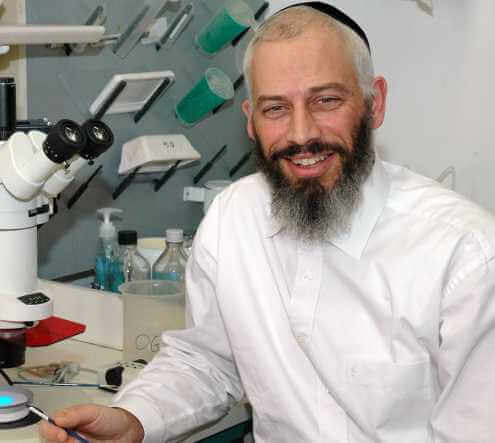Researchers at the Hebrew University reported that they found the gene responsible for malfunctions in the development of the ovary and fertility problems

The ovary in mammals functions not only as the reproductive organ containing the germ cells (eggs) responsible for creating the next generation, but it also acts as the gonad that hormonally controls many aspects of female development and physiology. Very little is known about the processes involved in the development of the ovary and egg. To date, only a few genes have been identified that are important in the development of the ovary and every finding in this field has great importance as far as the fields of infertility and fertility are concerned.
The researchers found a family with consanguineous marriages in which there were 4 female cousins with ovarian underdevelopment (they were not found to have ovaries) although in terms of chromosomes they had 2 X chromosomes like any normal woman. These girls did not go through a normal process of puberty as a result of a lack of sex hormones. Of course, they were treated with replacement hormones to help them reach a normal height and allow the appearance of a monthly cycle.
By searching for homozygous regions in the genome (common to the patients' daughters and not to healthy family members) and subsequently sequencing all the patients' genes, the researchers identified a mutation in the nucleoporin 107 gene (Nup107) that differentiates the patients from the healthy. This gene codes for a protein that is an important component of the channel that connects the cell nucleus (the section where the DNA is found) to the cytoplasm (the rest of the cell).
At this stage, the researchers were looking for a model system that would provide experimental proof of the link between the mutation and lack of ovarian development. The model was developed in the laboratory of Dr. Ofer Gerlitz from the Department of Developmental Biology and Cancer Research at the Israel-Canada Medical Research Institute in the Faculty of Medicine of the Hebrew University. The process of reproduction, the division of the germ cells (meiosis) and the creation of the egg is partially parallel in the fruit fly (Drosophila) and in humans. Therefore, the researchers created flies with a mutation in the nucleoporin 107 gene (the fly) identical to the one found in the female patients. To their astonishment, a large part of the flies had severe damage to the development of the ovaries (as in humans). The other flies that carried the mutation laid very few eggs, most of which were defective (no offspring). This of course proved the critical importance of the mutation and the nucleoporin 107 gene for the development of the ovary and the process of creating the egg.
According to Dr. Gerlitz, "The characterization of the Nup107 gene and finding its function in the development of the ovary will allow an understanding of how the passage of materials from the cytoplasm to the nucleus is uniquely involved in the development of the ovary and eggs. At the medical level, it will be possible to diagnose patients and carriers of the disease, prenatal diagnosis and prevention of severe morbidity in immaturity and infertility, and it is also possible to treat the problems of infertility and premature menopause."
According to Dr. Gerlitz, the model system (of lacking ovarian development) that was developed in conjunction with very advanced genetic and molecular techniques used in research in Drosophila will allow the identification of additional genes and signal transmission pathways involved in the development of the ovary and egg, and this will have extensive consequences both in the field of fertility and in many other fields in medicine and the biology of the cell
The main researchers of the study: Prof. David Tsangan (physician), director of the Children's Endocrinology Unit, Hadassah Mount Scopus; Prof. Efrat Levy-Lahad (physician) Director of the Department of Medical Genetics Shaare Zedek; Dr. Ofer Gerlitz (researcher) Department of Developmental Biology and Cancer Research Faculty of Medicine of the Hebrew University

One response
Well done